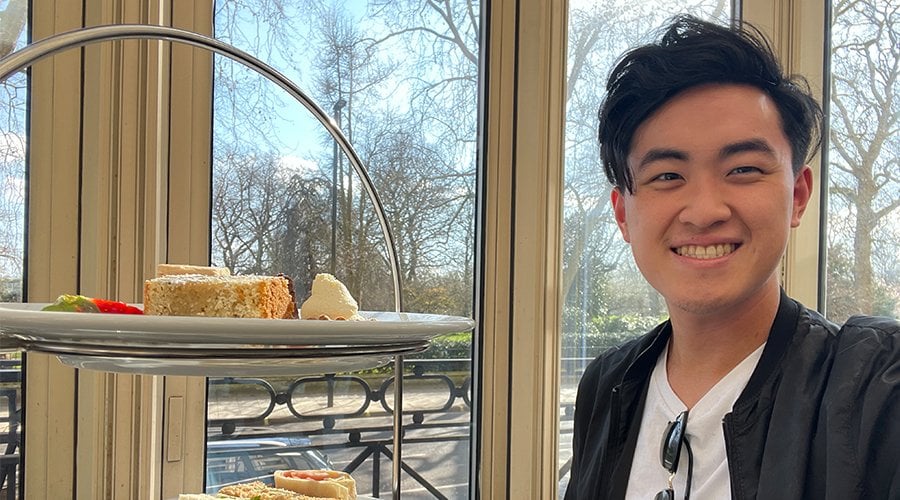Intercalating a master's in Global Health Nutrition
26 May 2022 London School of Hygiene & Tropical Medicine London School of Hygiene & Tropical Medicine https://lshtm.ac.uk/themes/custom/lshtm/images/lshtm-logo-black.png
Chris having afternoon tea in London
Please explain a bit about your academic/professional background
I’m an American medical student intercalating the MSc Nutrition for Global Health between my third and fourth years of medical school. In 2018, I graduated from the University of Houston with a BA in Liberal Studies and French and a BS in Biology. My past experience spans clinical and educational research, community programme development, and physician and public health advocacy.
Why did you choose to study your course at LSHTM?
Nutrition, food disparities, and culinary medicine are all topics in which I’ve developed an interest during my medical training. Physicians and allied health professionals are in a unique position to provide evidence-based nutritional advice, but there remain gaps in policy, practice, and education that limit the extent to which our patients can achieve optimal nutrition. I therefore sought to hone my research and policy skills to best address these issues by pursuing an intensive public health Masters, ideally with a strong nutrition component.
When looking through public health programmes, I found that LSHTM was one of a few institutions globally that had a global health nutrition course. I corresponded with last year’s student ambassadors as well as other LSHTM alumni from my medical school and felt confident that this institution would offer the depth of training and world-class scientific expertise that I had been searching for.
How are you finding your Master's so far, and what have you enjoyed most about your course?
It’s been really fascinating learning first-hand from all of these international leaders and researchers in the sphere of global health nutrition. I’ve also enjoyed getting the chance to develop my thinking from the perspective of a public health researcher or policymaker. Without a doubt the best part of the course is collaborating, interacting, and socialising with all my fellow MSc peers both inside and outside the classroom - nutrition is such an interdisciplinary field, and that’s reflected in the diversity of thought and experiences in our cohort. Now I’m friends with folks from all over the world, some just out of undergrad and others with decades of experience in medicine, public service, and research.
It’s been really fascinating learning first-hand from all of these international leaders and researchers in the sphere of global health nutrition.
How did you find the mix of online and in-person teaching?
At first, I was unsure whether I’d even accept my offer at LSHTM if our teaching were to be mostly online. But once I arrived in London I realised that hybrid teaching was what I had always been accustomed to in medical school, allowing for the greatest flexibility to attend lectures and seminars in the way that I know best benefits my own learning style. I’m thankful that my modules this term offer in-person and virtual teaching simultaneously, with both options equally good as one another.
What key skills are you gaining from studying this programme?
The nutrition modules focus on very practical, “real world” objectives such as writing a scientific research paper, policy brief, or technical report. For me, I’ve particularly appreciated my statistics and epidemiology modules as I’ve picked up a lot of foundational skills in Stata and R.
What have been the best aspects of studying in London?
London is a dynamic and diverse community, so I found it easy to make the transition to living here. LSHTM is part of the University of London system and I live in one of the intercollegiate halls, which makes me feel as if I were part of a larger intellectual community despite the smaller size of our school. There’s always arts and academic events to attend – sometimes too many to choose from! – and the public transportation network helps me get around town with ease. I’m looking forward to the long summer days when I’ll be working on my capstone project.
What advice would you give to someone considering studying your course at LSHTM?
The summer reading recommended by programme leadership is a fantastic primer to the field, particularly for students who are starting the course without a nutrition or life sciences background. I think the Term 1 modules do a great job getting everyone to the same level, so my most important advice is to come curious and excited to get the most out of every day! It’s also a smaller programme than some of the others, so you’ll really get to know your peers and faculty – don’t hesitate to reach out to them if you ever have questions or ideas to share.
- Find out more about intercalating study.
- Explore funding and scholarship opportunities.
- Discover the MSc Nutrition for Global Health.

